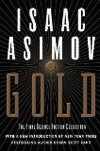Gold is Isaac Asimov’s first original collection of science fiction in over a decade. It is also his last science fiction collection, one containing all of his uncollected SF stories that have never before appeared in book form.
Here is the final and crowning achievement of the fifty-year career of science fiction’s transcendent genius, the world-famous author who defined of SF for its practitioners, for its millions of readers, and for the world at large. The stories, here collected for the first time, range from the humorous to the profound, for Asimov was engaged until the end of his days in the work of redefining and expanding the boundaries of the literature he loved, and indeed, helped create.
Gold also contains Asimov’s previously uncollected writings about the craft of science fiction, a treasure trove of practical advice and hard-won wisdom from one of the world’s most prolific authors. In addition, Gold contains selected and previously uncollected essays about science fiction itself, as the Grand Master writes on his own innovations such as psychohistory and robotics, and looks toward the future of the field.
But the soul of this final collection is the fiction, and at its heart is the title story, Gold; a moving and revealing drama about a writer who gambles everything on a chance at immortality—a gamble Asimov himself made. And won.
On the whole, this is actually a fairly disappointing collection.
As with other “late” anthologies of Asimov’s work, the stories collected here are included more for the sake of their not having been collected before than anything else. The net effect is that only two of the stories, “Cal,” and “Gold” are really worthwhile at all. I actually enjoyed “Cal” somewhat more than “Gold,” although the latter won a Hugo; but there are people who would rate them differently.
This book is also padded by including a number of editorials from Asimov’s Science Fiction and other sf-related non-fiction (such as introductions to anthologies co-edited by Asimov). Not all of the material here is new, and very little is truly outstanding. The fact that the book includes it at all is a bad sign, since it means that there simply weren’t enough stories to otherwise be worthwhile.
In the end, the only possible reasons for owning this collection are “Cal” and “Gold.” Given that, it might be best to look for a nice used copy; even $10 for the ebook feels a little pricey.
Contents





